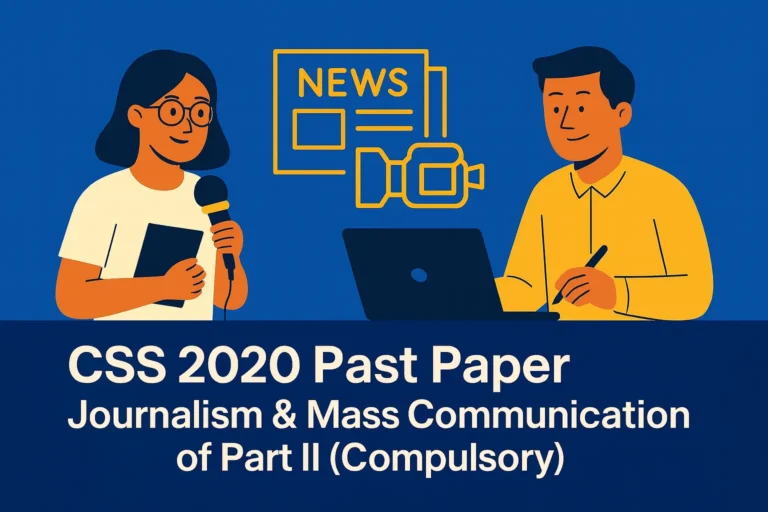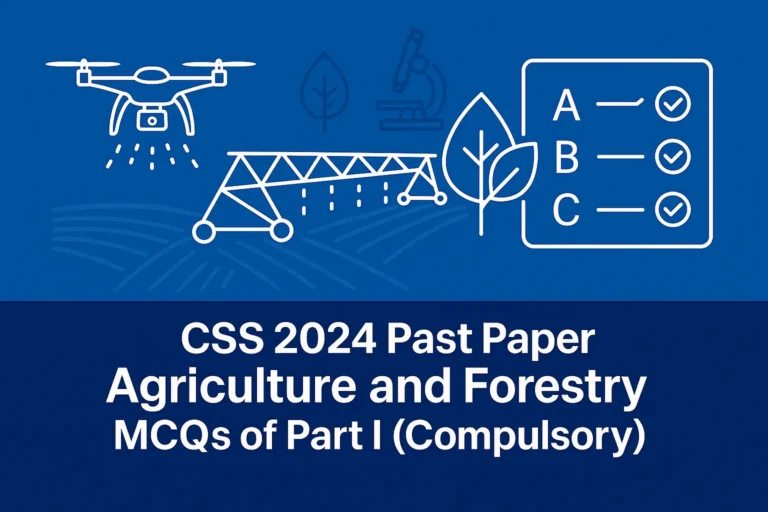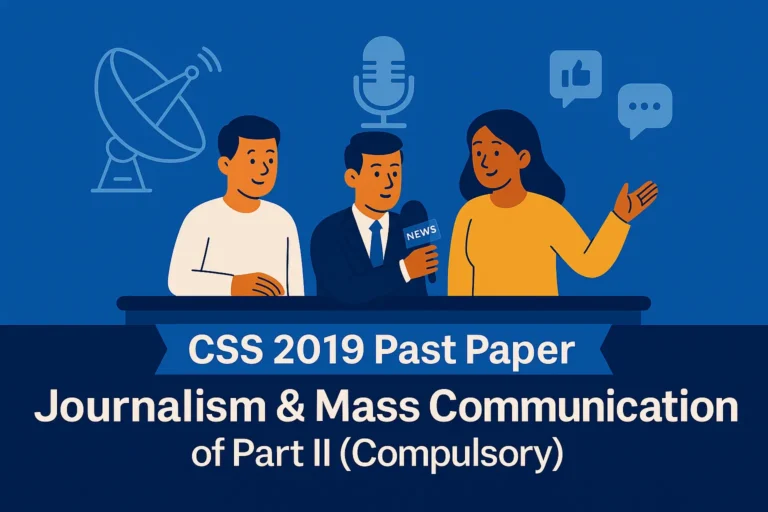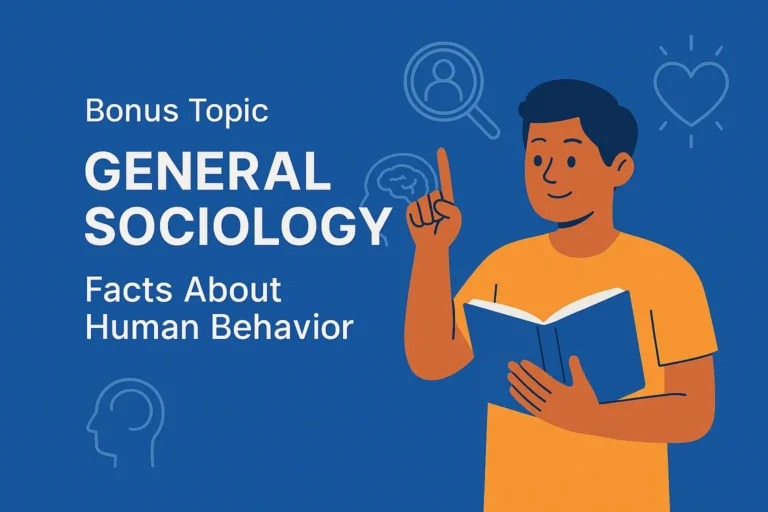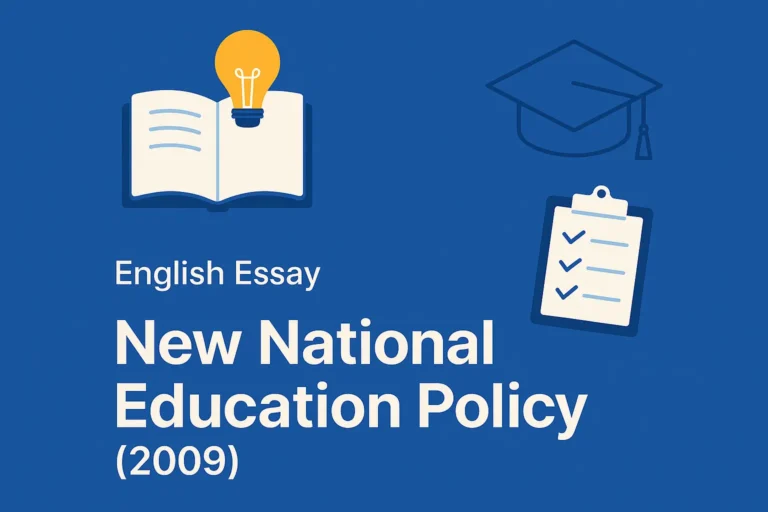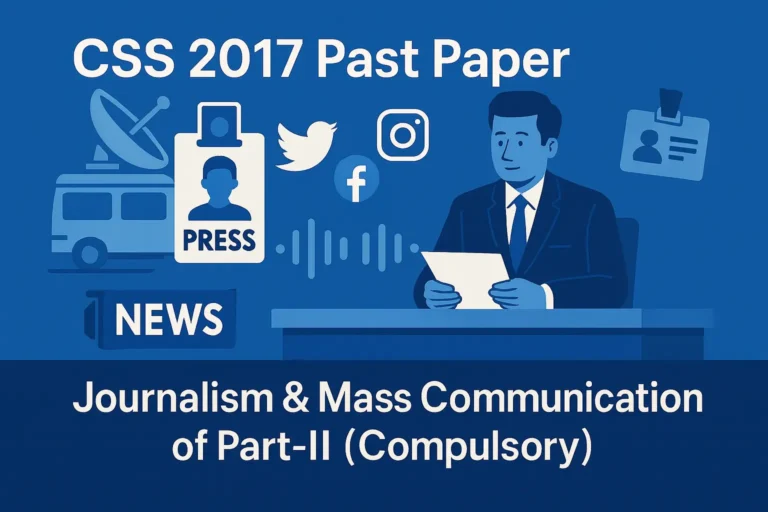CSS 2025 Solved Past Paper – Public Administration MCQs of Part-I (Compulsory)
Below are the solved multiple-choice questions (MCQs) of Part-I from the CSS 2025 Public Administration paper. Each question includes all the options, the correct answer is bolded, and a short explanation is provided for clarity.
1. One of the Core Values of Public Administration is:
(A) Social equity
(B) Accountability
(C) Positive Attitude
(D) None of these
💡 Accountability is universally recognised as a central value of Public Administration.
2. The application of business practices in Public Management is called:
(A) Public Administration
(B) Public Management
(C) New Public Service
(D) None of these
💡 New Public Service stresses citizen-oriented practices and adapts business-like methods in governance.
3. Who is considered as father of Bureaucracy:
(A) Max Weber
(B) Taylor
(C) Drucker
(D) None of these
💡 Max Weber introduced the concept of rational-legal bureaucracy with hierarchy and rules.
4. Network Governance promotes:
(A) Inter-organizational coordination
(B) Bureaucratic structure
(C) Formal association
(D) None of these
💡 Network Governance emphasises collaboration across agencies and organisations.
5. Proactive Strategies imply to:
(A) Actions based on condition and circumstances
(B) Reaction based on events
(C) Anticipation and prevention based on planning
(D) None of these
💡 Proactive strategies focus on anticipation and prevention, not just reaction.
6. Organizational Structure is a:
(A) Framework to perform managerial and operating tasks
(B) Framework to solve issues
(C) Framework to bring social reforms
(D) None of these
💡 Organisational structure defines tasks, authority, and roles for operations.
7. MBO focuses on:
(A) Performance against set targets
(B) Performance against reactive strategies
(C) Performance against expectations
(D) None of these
💡 Management by Objectives (MBO) links performance to agreed targets.
8. “Wealth of Nations” is authored by:
(A) F.W Taylor
(B) Adam Smith
(C) Woodrow Wilson
(D) None of these
💡 Adam Smith’s 1776 book laid the foundation of economics and liberalism.
9. Line-Item Budgeting includes:
(A) Only inputs
(B) Only outputs
(C) Both (A) & (B)
(D) None of these
💡 Line-item budgeting emphasises expenditure on inputs (salaries, equipment, etc.).
10. Rationalizing expenditure for economy can reduce:
(A) Fiscal Deficit in government budget
(B) Recreational activities
(C) Expensive projects
(D) None of these
💡 Controlling unnecessary spending helps reduce fiscal deficit.
11. Favoring political supporters by giving jobs is known as:
(A) Spoils system
(B) Referral system
(C) Affiliate System
(D) None of these
💡 The spoils system distributes jobs as political rewards.
12. Hiring and promoting people on ability is known as:
(A) Merit system
(B) Bureaucratic system
(C) Spoils system
(D) None of these
💡 Merit system ensures recruitment and promotion based on competence.
13. Open System is:
(A) More complex than close system
(B) Simpler than close system
(C) Easier to handle
(D) None of these
💡 An open system interacts with its environment, hence more complex than closed.
14. Assigning work to others is known as:
(A) Proscription
(B) Delegation
(C) Interdiction
(D) None of these
💡 Delegation is the process of assigning work to subordinates.
15. Where people are held responsible for their decision making is known as:
(A) Autonomy
(B) Own Responsibility
(C) Self Sufficiency
(D) None of these
💡 Autonomy means freedom in decision-making with accountability.
16. Diversity Management means:
(A) Acknowledgment of difference among people and valuing them
(B) Identifying diversity based on exclusion
(C) Ethnic identification
(D) None of these
💡 Diversity management is about recognising and valuing differences in workforce.
17. Good Governance does not include:
(A) Accountability
(B) Nepotism
(C) Answerability
(D) None of these
💡 Nepotism contradicts the very principles of good governance.
18. Good Governance implies:
(A) Existence of honest government
(B) Existence of fair judges
(C) Existence of honest civil servants
(D) None of these
💡 Honest, transparent government is central to good governance.
19. One of the major challenges of local government is:
(A) Inadequate devolution of power and functions
(B) Adequate devolution of power and functions
(C) Inadequate evolution of power and functions
(D) None of these
💡 Local governments often fail due to insufficient power devolution.
20. Bureaucracy is considered as:
(A) Traditional Authority
(B) Personal Authority
(C) Leadership Authority
(D) None of these
💡 Weber classified bureaucracy under traditional authority based on rules and hierarchy.

